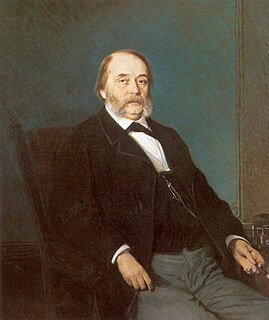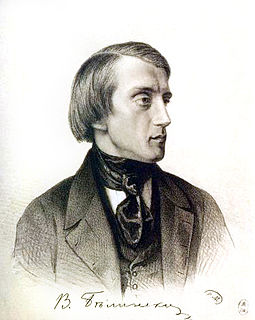Related Research Articles

Mikhail Yevgrafovich Saltykov-Shchedrin, was a major Russian satirist of the 19th century. He spent most of his life working as a civil servant in various capacities. After the death of poet Nikolay Nekrasov he acted as editor of the well-known Russian magazine, Otechestvenniye Zapiski, until the government banned it in 1884. His best-known work, the novel The Golovlyov Family, appeared in 1876.

Ivan Alexandrovich Goncharov was a Russian novelist best known for his novels A Common Story (1847), Oblomov (1859), and The Precipice (1869). He also served in many official capacities, including the position of censor.

Nikolay Alexeyevich Nekrasov was a Russian poet, writer, critic and publisher, whose deeply compassionate poems about peasant Russia made him the hero of liberal and radical circles of Russian intelligentsia, as represented by Vissarion Belinsky, Nikolay Chernyshevsky and Fyodor Dostoyevsky. He is credited with introducing into Russian poetry ternary meters and the technique of dramatic monologue. As the editor of several literary journals, notably Sovremennik, Nekrasov was also singularly successful and influential.

Vissarion Grigoryevich Belinsky was a Russian literary critic of Westernizing tendency. Belinsky played one of the key roles in the career of poet and publisher Nikolay Nekrasov and his popular magazine Sovremennik. He was the most influential of the Westernizers, especially among the younger generation. He worked primarily as a literary critic, because that area was less heavily censored than political pamphlets. He agreed with Slavophiles that society had precedence over individualism, but he insisted the society had to allow the expression of individual ideas and rights. He strongly opposed Slavophiles on the role of Orthodoxy, which he considered a retrograde force. He emphasized reason and knowledge, and attacked autocracy and theocracy.

Count Aleksey Konstantinovich Tolstoy, often referred to as A. K. Tolstoy, was a Russian poet, novelist and playwright, considered to be the most important nineteenth-century Russian historical dramatist, primarily on the strength of his dramatic trilogy The Death of Ivan the Terrible (1866), Tsar Fyodor Ioannovich (1868), and Tsar Boris (1870). He also gained fame for his satirical works, published under his own name and under the collaborational pen name of Kozma Prutkov. His fictional works include the novella The Family of the Vourdalak, The Vampire (1841), and the historical novel Prince Serebrenni (1862).

Afanasy Afanasyevich Fet, later known as Shenshin, was a renowned Russian poet regarded as the finest master of lyric verse in Russian literature.

Apollon Nikolayevich Maykov was a Russian poet, best known for his lyric verse showcasing images of Russian villages, nature, and history. His love for ancient Greece and Rome, which he studied for much of his life, is also reflected in his works. Maykov spent four years translating the epic The Tale of Igor's Campaign (1870) into modern Russian. He translated the folklore of Belarus, Greece, Serbia and Spain, as well as works by Heine, Adam Mickiewicz and Goethe, among others. Several of Maykov's poems were set to music by Russian composers, among them Rimsky-Korsakov and Tchaikovsky.

Aleksey Nikolayevich Pleshcheyev was a radical Russian poet of the 19th century, once a member of the Petrashevsky Circle.

Sovremennik was a Russian literary, social and political magazine, published in Saint Petersburg in 1836–1866. It came out four times a year in 1836–1843 and once a month after that. The magazine published poetry, prose, critical, historical, ethnographic and other material.

Pavel Ivanovich Melnikov was a Russian writer, best known for his novels In the Forests and On the Hills, which describe the unique life of Transvolga and use its dialects.
Westernizers were a group of 19th-century intellectuals who believed that Russia's development depended upon the adoption of Western European technology and liberal government. In their view, western ideas such as industrialisation needed to be implemented throughout Russia to make it a more successful country. In Russian the term was known as zapadnichestvo (зáпадничество), which can be translated as "westernism", and its adherents were known as the zapadniki, westernists in English.

Valerian Nikolayevich Maykov was a Russian writer and literary critic, son of painter Nikolay Maykov, brother of poet Apollon and novelist Vladimir Maykov. Valerian Maykov, once a Petrashevsky Circle associate, was considered by contemporaries as heir to Vissarion Belinsky's position of Russia's leading critic, and later credited for being arguably the first in Russia to introduce scientific approach to the art of literary criticism.
Three Deaths is a lyric drama by Apollon Maykov. Its original version, called "The Choice of Death", finished in 1851, had problems with censorship and was first published, severely cut, under the title Three Deaths in 1857, in the October (No.10) issue of Biblioteka Dlya Chtenyia. The final version of it appeared in the Complete A.N. Maykov (1893).
Sketches of Rome is Apollon Maykov's second book of poetry, published in 1847.

Nikolay Gavrilovich Chernyshevsky was a Russian revolutionary, materialist philosopher, editor, critic, and socialist. He was the leader of the revolutionary movement of the 1860s, and had an influence on Vladimir Lenin, Emma Goldman, and Svetozar Marković.
Two Worlds is a tragedy in verse by Apollon Maykov first published in February 1882 issue of The Russian Messenger. It represents the final part of the poetic cycle dealing with the conflict between paganism and Christianity. In 1882 Two Worlds won its author the Pushkin Prize for literature and was hailed as his most prominent work to date.
The Princess is a poem by Apollon Maykov first published in the January 1878 issue of The Russian Messenger. It told the story of a young Russian girl belonging to a noble family who joined a group of radical youth fighting against the repressive state. The poem, condemned by the Russian literary left of the time, in retrospect is seen as a strong political statement attacking both the corrupt political system of mid-19th-century Russia, based on serfdom and the violent methods of undermining it, as professed by the 'nihilistic' youth of the time.
The Wanderer is a poem by Apollon Maykov, first published in the No.1, January 1867 issue of The Russian Messenger. It was dedicated to Fyodor Tyutchev and subtitled: "First part of the drama The Thirsty One".
Natural School is a term applied to the literary movement which arose under the influence of Nikolai Gogol in the 1840s in Russia, and included such diverse authors as Nikolai Nekrasov, Ivan Panayev, Dmitry Grigorovich, Ivan Turgenev, Alexander Hertzen, Ivan Goncharov, Vladimir Dal, Mikhail Saltykov-Shchedrin, Fyodor Dostoyevsky and Evgeny Grebyonka, among others. Modern day Russian historians of literature use the term only in its historical context, otherwise preferring to speak of "the earliest stage of critical realism in Russia."
References
- 1 2 "Commentary to Two Fates by A.N.Maykov". Works by A.N. Maykov in 2 volumes, Vol.2 Moscow, Pravda Publishers. 1984. Retrieved 2012-12-01.
- ↑ Pryima, Fyodor (1984). "A.N.Maykov's Poetry". Pravda Publishers. Retrieved 2012-03-01.
- ↑ Zlatkovsky, A.M., Apollon Nikolayevich Maykov, Saint Petersburg, 1888, p. 40
- ↑ Ezhegodnik, 1975, p. 85
- ↑ The Complete V.G. Belinsky, Vol. VIII, p. 635
- ↑ Herzen, A.I. The Works of... in 30 volumes. Moscow, 1954-1961, Vol. 2, p. 444
- ↑ The Complete N.G. Chernyshevsky in 15 volumes. Moscow, 1939-1953. Vol.14, p. 47.